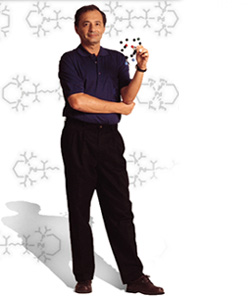Are you a journalist? Please sign up here for our press releases
Subscribe to our monthly newsletter:
"Redesigning organic molecules may lead to the development of new and effective carriers for drugs and the creation of computerized memory switches much tinier than anything known today. But before that, one should keep in mind that 25% of the Gross National Product of the U.S. depends on industrial activity involving catalysis. Think of the change that would occur if one designed molecular catalysts a thousand times more effective than those existing today."
Prof. David Milstein Head of the Organic Chemistry Department and the Helen and Martin Kimmel Center for Molecular Design
Prof. Milstein holds the Israel Matz Chair of Organic Chemistry

Chemical reactions of organic molecules are a function of the atoms they contain, the nature of their chemical bonds, and the three-dimensional spatial structure of the molecules. Suppose a particular refrigerant harms the environment by destroying the atmospheric ozone layer. The ideal solution would be to redesign the molecule of this substance so that it could still do its work, without damaging the ozone. Or suppose that a certain industrial chemical process works by means of the action of a solid catalyst. Both efficiency and cost would be greatly improved if the molecules of the catalyst were redesigned to act individually, rather than as slow-acting chunks of solid material.
These possibilities, and many others, are now within reach. Scientists at the Weizmann Institute's Organic Chemistry Department, headed by Prof. David Milstein, have discovered how to gently and selectively break the bonds linking carbon atoms, and have constructed novel bonds in their place .It is gradually becoming clear that redesigning molecules may lead to the a different and extraordinary future.